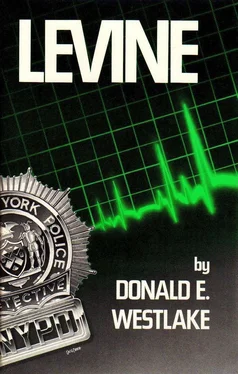After three stories, there was no longer any question in my mind that I had a series on my hands, but at that time I had no idea what one did with a series. A story — any story — is about several different things, at different levels. It is about its plot, for instance, but only in the worst and most simplistic writers do specific plots repeat themselves often enough to be termed a series. The repetition of characters makes a series, but if the characters in the original story are tied to a theme or a concern or a view of life that colors them and helps to create them, can they live in stories that are irrelevant to that extra element? I don’t think so, and I think over the years there have been several series characters who have been less than they might have been because their later adventures never touched upon those thematic elements which had created the character in the first place.
So if I was going to write another story about Abe Levine, it would have to tie in with his relationship with death, his attitude toward death, his virtual romance with death. Death fascinated Levine, it summoned him and yet repelled him; how could I write a story about Abe Levine without that element?
I couldn’t. The series might have died aborning right then, three stories in. I still didn’t want to write the one for which I’d had that rough idea, and no other story that included both the character and the theme came to the surface of my brain. Goodbye, Abe.
It was, in fact, not quite a year before another story came along that suited the character and the theme; and had the potential as well to broaden both. It marked a real change in the stories, since for the first time Levine was attacked directly in the area of his weakness. He had been attacked before, as any policeman is liable to be attacked, but in “The Sound of Murder” (my title, left unchanged, hallelujah) Levine is attacked in a way specific to Levine, particular to the character and particular to the theme. The generational element became more obvious, though it had been there in some way since the first story. “The Sound of Murder” took Abe Levine farther down the same road, and when I finished it, I wondered if I hadn’t gone too far, if this most recent experience might not have changed Levine too much, and made him someone no longer relevant to his theme? An odd finish for a character, if true. (That did happen, as a matter of fact, a decade later, to the hero of a series of mystery novels I’d written under the name of Tucker Coe.)
That story, “The Sound of Murder,” was written during a strangely sporadic period of my writing life. I had written two mystery novels. The Mercenaries and Killing Time , published by Random House, and in the summer of 1961 had started a third which I already knew would be called 361, which is the numerical classification in Roget’s Thesaurus for “Murder, violent death.” Random House did eventually publish the book under that title, with a note in front explaining what the tide meant, but they didn’t do what I’d wanted, which was to run, in the form of a frontispiece quote, the entire 361 listing from the Thesaurus . Read it for yourself some time, and you’ll see why I found it striking and wanted to use it.
In any event, 361 was the coldest book I’d tried to write up to that time, a book in which the first-person narrator would never once state his emotions, but in which the emotions would have to be implied by the character’s physical actions. It was an easy mood to get into, but a hard book to write, and in the middle of it I stopped and switched to another book entirely, one I’d been thinking about for a while, a paperback-style tough guy novel in which the entire world would be like my 361 hero; a world of unstated emotion and hard surfaces. That book was finished in September of 1961, and was published in February of 1963 as The Hunter (my title!) by Pocket Books, under the pen name Richard Stark, a name I’d already used for a few of that spate of short stories from 1959.
Having finished The Hunter , I should have gone back to finish 361, but I think I wasn’t ready for two emotionless heroes in a row, and that’s when the idea for “The Sound of Murder” came bubbling to the surface. Levine is emotional, the Lord knows, and I notice that in this story he even makes a point of his being emotional. It was written in October of 1961 and published in Alfred Hitchcock’s Mystery Magazine in December of 1962. “The Sound of Murder” restored some juice to my brain, some humanity, and made it possible for me to go on and finish 361 .
Another idea for a Levine story had emerged at the same time, fed by the same impulses, another permutation on Levine’s reaction to violent death, but that other story had seemed much more of a problem and I’d chosen to ignore it. Not that it would have been a problem to write, but that it might be a problem to publish. The first four Levine stories had all appeared in Alfred Hitchcock’s Mystery Magazine , but the story I had in mind seemed inappropriate for that market. Unfortunately, I couldn’t think of another publication more likely to find it useful, so I turned my back on it, for as long as I could.
Which turned out to be seven months. After four novelettes, after nearly forty thousand words, I had grown to know and to like Abe Levine. The story I had in mind, which I was calling “The Death of a Bum,” was somehow the inevitable next step in Levine’s narrowing relationship with death. It was not, in the normal sense of the word, a “mystery” story, which was why I knew Hitchcock’s would have trouble with it. Remove Levine from it and it wasn’t a story at all; I had written myself into a terrible corner, the one in which the character himself has become the world in which the story is set. (A simpler and sillier example of this is Batman . Somewhere around 1955, the evil activity most pursued by the criminals in Batman became the uncovering of Batman’s identity! If Batman didn’t exist, they wouldn’t be criminals. In self-referential fiction, I can think of no peer to Batman .)
Nevertheless, for seven months I turned my attention to other things, and it wasn’t until May of 1962 that I finally gave in to the inevitable and wrote “The Death of a Bum.” It was one of the easiest writing tasks I’ve ever had; I knew the character somewhat better than I knew myself; I had known the story for more than half a year; I had already decided it was uncommercial, so there was no point trying to please any particular editor or audience. Sometimes writers say that this or that story “wrote itself,” which is never true, but “The Death of a Bum” required a lot less midwifing than usual.
As I’d expected, Alfred Hitchcock’s Mystery Magazine couldn’t use the story, though the editor wrote a very nice and sincere letter — not of apology, but of regret, since he too had grown to like Levine. I wrote back explaining that I’d been prepared for the rejection and was neither surprised nor hurt. I then left it to my agent to do what he could.
It took nearly three years, and I don’t know how many submissions, but at last “The Death of a Bum” was published, in Mike Shayne’s Mystery Magazine , in June of 1965. And there the series ended.
It ended for a variety of reasons. One of them, naturally, was the three-year span between the writing of “The Death of a Bum” and its publication; I felt I couldn’t write a new story about Abe Levine before the previous story had found a home. This may seem an unnecessary self-restriction, but in my mind the stories had evolved in such a clear step-by-step way, each one leading to the next, that a story written after “The Death of a Bum” but published before it or instead of it would at least for me have destroyed the organic reality of the character and his life.
Читать дальше






